Here’s a surprise: Switzerland doesn’t have a single “Swiss language” at all! Many people assume the Swiss speak some unique Alpine tongue, but the reality is far more fascinating. Step into a Swiss train station and you might hear conversations flowing in German, French, Italian, or even the mysterious Romansh – sometimes all within the same hour.
Understanding what language Swiss people speak matters more than you might think. It affects everything from business meetings in Zurich to vacation plans in Geneva, from understanding Swiss politics to appreciating why this small country punches above its weight culturally. For travelers, knowing the linguistic landscape means smoother interactions and deeper cultural connections.
Switzerland is a unique multilingual nation with four official languages – German, French, Italian, and Romansh – each contributing to its rich cultural tapestry and regional identities, making the answer to “What language do Swiss speak?” far more complex than a single tongue.
You’ll discover how these four languages divide geographically, why Swiss German sounds nothing like the German you learned in school, how historical events shaped this linguistic puzzle, and what this multilingual reality means for daily life in modern Switzerland. Most importantly, you’ll learn that Switzerland recognizes German, French, Italian, and Romansh as its four official languages.
The Four Official Languages of Switzerland

What “Official Language” Means in Switzerland
In Switzerland, having four official languages means the federal government must provide services, write laws, and conduct business in German, French, and Italian. Romansh gets special protection as a national language. This creates linguistic equality in principle, even though the numbers of speakers vary dramatically.
The country even uses Latin – “Confoederatio Helvetica” – on coins and official documents to avoid favoring any one language. This neutral approach reflects Switzerland’s commitment to linguistic fairness, though it creates practical challenges for everything from government translation to road signs.
German: The Majority Language
About 62-63% of Swiss people speak German, making it the clear majority language. You’ll find German speakers across the northern, central, and eastern regions, including major cities like Zurich, Basel, and Bern. But here’s where things get interesting – the German that Swiss people actually speak daily is completely different from what you’d hear in Germany.
Swiss German vs. Standard German: A Crucial Distinction
Swiss German isn’t really “German” at all – it’s a collection of Alemannic dialects that developed separately from standard German over centuries. When Swiss people chat with friends, argue in shops, or talk to their kids, they use Swiss German. When they write emails, read newspapers, or attend formal meetings, they switch to standard German.
This creates a fascinating linguistic split. A German tourist might struggle to understand a casual conversation in Zurich, even though both people technically speak “German.” Swiss German includes unique words like “Grüezi” (hello) instead of “Guten Tag,” or “Velo” (bicycle) instead of “Fahrrad.”
Regional Variations Within Swiss German
“Swiss German” isn’t even one dialect – it’s dozens of local variations. Someone from Zurich speaks differently from someone in Bern, who sounds different from someone in Basel. These differences go beyond accent to include vocabulary, grammar, and expressions that mark you as local to your specific canton.
Cultural Significance of Swiss German
Swiss German carries deep emotional weight for German-speaking Swiss. It represents local identity, community belonging, and cultural resistance to outside influence. Many Swiss feel more comfortable expressing emotions, humor, and personal thoughts in Swiss German, even if they write professionally in standard German. This linguistic intimacy helps explain why Swiss German remains so vibrant despite centuries of standard German education.
French (La Romandie): The Western Charm
About 22-23% of Swiss people speak French, concentrated in western Switzerland in a region called Romandy. This includes entire cantons like Geneva, Vaud, Neuchâtel, and Jura, plus French-speaking parts of Bern, Fribourg, and Valais. If you visit cities like Geneva, Lausanne, or Montreux, French will be the dominant language you hear on the streets.
Geneva holds special significance as a French-speaking city. As home to numerous international organizations, the United Nations, and various NGOs, French here carries diplomatic weight. Many global negotiations happen in French, reinforcing the language’s international importance beyond Switzerland’s borders.
Swiss French vs. Standard French
Swiss French stays remarkably close to standard French compared to how dramatically Swiss German differs from German. A French person visiting Geneva would understand conversations perfectly, though they might notice some charming local expressions.

The most famous differences involve numbers. While French people say “soixante-dix” (sixty-ten) for 70, Swiss French speakers say “septante” (seventy). Similarly, they use “nonante” (ninety) instead of “quatre-vingt-dix” (four-twenty-ten) for 90. These logical number names make Swiss French actually easier to learn than standard French.
Swiss French also includes subtle pronunciation differences and occasional local expressions, but these variations remain minor compared to other Swiss languages.
Cultural Connections
French-speaking Switzerland maintains strong cultural ties with France through media, literature, and academic exchanges. Students often pursue higher education in French universities, while French television, radio, and newspapers remain popular. This cultural connection helps keep Swiss French aligned with international French while maintaining distinctive local character.
Italian (Svizzera italiana): The Southern Influence
Italian speakers make up about 8% of Switzerland’s population, concentrated primarily in Ticino canton and some valleys in Graubünden. This creates a distinctly Mediterranean atmosphere in southern Switzerland, where Italian dominates daily life, business, and local culture.
Ticino, with cities like Lugano and Bellinzona, feels more like northern Italy than traditional Switzerland. The architecture, food culture, and lifestyle reflect strong Italian influence, while the language serves as a bridge between Swiss and Italian cultures.
Swiss Italian Characteristics
Swiss Italian closely resembles standard Italian, making it easily understood by Italian visitors. However, centuries of separation have created subtle differences, including vocabulary borrowed from German and French neighbors. Some areas show influence from Lombard dialects, reflecting historical connections with northern Italy.
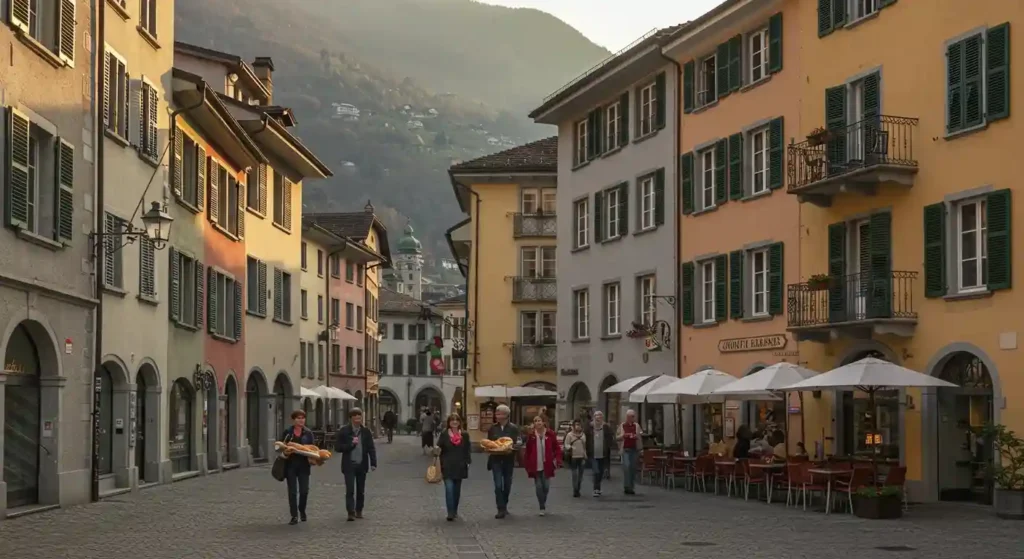
Local expressions and pronunciation patterns give Swiss Italian its distinctive character, though these differences remain less dramatic than Swiss German’s variations. Most Swiss Italian speakers can switch comfortably between their local variety and standard Italian depending on the situation.
Cultural Significance
Italian-speaking Switzerland maintains vibrant cultural connections with Italy through media, education, and family ties. Many families have relatives across the border, creating ongoing cultural exchange. Local newspapers, radio stations, and television programming in Italian help preserve the language while adapting to Swiss political and social realities.
The region’s identity balances Italian cultural heritage with Swiss political values, creating a unique Mediterranean-Alpine fusion that distinguishes it from both northern Switzerland and neighboring Italy.
Romansh (Rumantsch): Switzerland’s Hidden Gem
Romansh represents one of Switzerland’s most fascinating linguistic treasures. This Rhaeto-Romance language descended directly from Latin, making it one of the oldest languages still spoken in the Alps. Roman soldiers and settlers brought Latin to these mountain valleys over 2,000 years ago, and it evolved into today’s Romansh while remaining isolated from other Romance languages.

Switzerland recognized Romansh as a national language in 1938, then upgraded it to full official status in 1996 for communication with Romansh speakers. This means the federal government must provide services in Romansh when requested, though practical limitations exist given the small speaker population.
A Tiny but Treasured Community
Less than 1% of Switzerland’s population speaks Romansh – roughly 35,000-40,000 native speakers concentrated in Graubünden canton. This makes Romansh speakers a tiny minority, yet they maintain fierce pride in their linguistic heritage and cultural identity.
Graubünden itself is trilingual, with German, Italian, and Romansh all holding official status. Some valleys remain predominantly Romansh-speaking, while others show increasing German influence as younger generations move to cities or intermarry with German speakers.
Five Dialects, One Written Language
Romansh actually consists of five distinct regional dialects called “idioms”: Sursilvan, Sutsilvan, Surmiran, Puter, and Vallader. Each developed independently in separate valleys, creating significant differences in vocabulary, pronunciation, and grammar.
To address this fragmentation, linguists created “Rumantsch Grischun” – a standardized written form combining elements from all five dialects. This artificial language appears in official documents, school textbooks, and media, though it remains controversial among speakers who prefer their local varieties.
Fighting for Survival
Romansh faces serious challenges from urbanization and German dominance. Young people often leave Romansh valleys for education or employment, returning with German spouses and children who speak German at home. This gradual erosion threatens the language’s long-term survival.
However, strong preservation efforts continue. The government funds Romansh schools, radio programs, and cultural initiatives. Local communities organize festivals, maintain traditions, and insist on using Romansh in daily life. These efforts reflect the language’s unique symbol of Swiss heritage and linguistic diversity.
How Multilingualism Shapes Switzerland
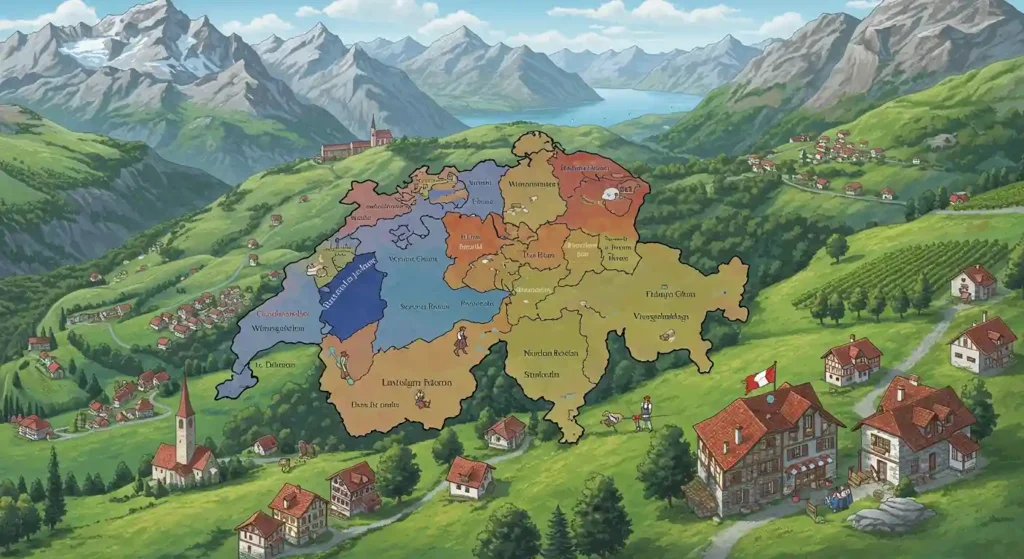
Political and Social Benefits
Switzerland’s multilingual system creates unique political advantages. The federal structure gives cantons significant autonomy over language policy, allowing each region to maintain its linguistic character while participating in national governance.
This linguistic diversity fosters tolerance and understanding across communities. Swiss people grow up accepting that neighbors might speak different languages, creating a natural acceptance of diversity that extends beyond language to other cultural differences.
The consensus-based political system requires constant translation and cross-cultural communication. Politicians must appeal to German, French, and Italian speakers, encouraging moderate positions that work across linguistic boundaries.
Education Across Languages
Swiss children learn their canton’s primary language first, then study at least one other national language. German speakers learn French, French speakers learn German, and everyone gains exposure to Switzerland’s linguistic complexity.
This early multilingual education creates adults comfortable switching between languages and cultures. Many Swiss people can conduct business in multiple languages, travel easily across linguistic regions, and appreciate different cultural perspectives within their own country.
Daily Multilingual Life
Switzerland’s multilingual reality appears everywhere. Train announcements cycle through German, French, and Italian. Product labels include multiple languages. National television broadcasts programs in different languages throughout the day.
Traveling across Switzerland means crossing invisible linguistic borders. You might start your day reading German newspapers in Zurich, have lunch while hearing French conversations in Geneva, and end up listening to Italian radio in Lugano – all within the same small country.
Challenges and The Future of Swiss Languages
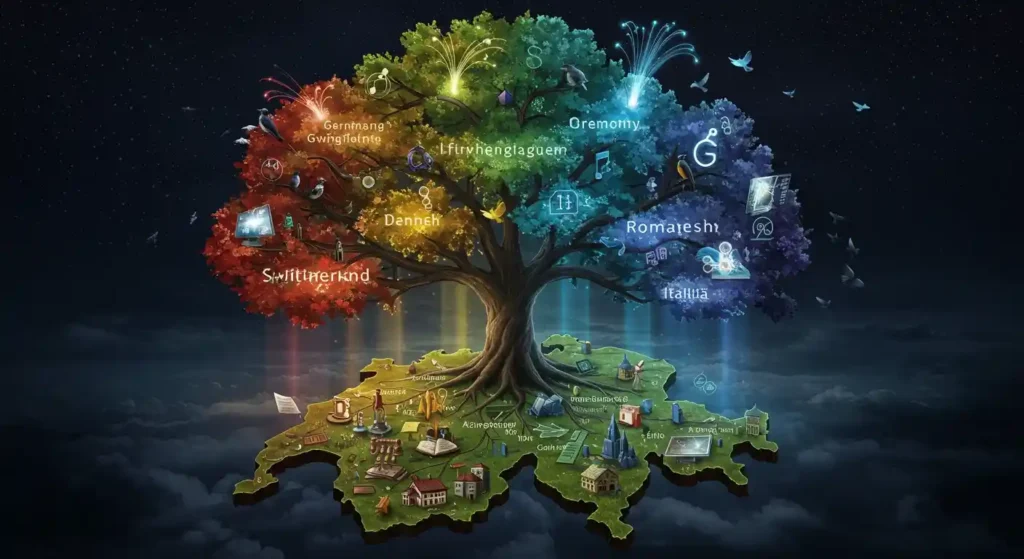
Modern Pressures
Switzerland’s smaller languages face increasing pressure from dominant languages and globalization. Romansh struggles against German expansion, while English grows in business and education settings. Young people increasingly use English for international communication, potentially weakening connections to traditional languages.
Urban areas see more linguistic mixing as people migrate for work or education. This creates opportunities for language contact but also threatens smaller linguistic communities that depend on geographic concentration for survival.
Preservation Efforts
The Swiss government actively supports all four national languages through funding, education policies, and cultural initiatives. Language courses, media programming, and cultural events receive public support to maintain linguistic heritage.
Local communities organize their own preservation efforts, from Romansh cultural festivals to dialect preservation groups. These grassroots initiatives complement official policies with passionate community involvement.
Future Outlook
Switzerland remains committed to its unique multilingual identity despite modern challenges. This linguistic diversity represents more than communication – it embodies Swiss values of tolerance, federalism, and cultural respect. As long as these values remain central to Swiss identity, the country will continue protecting and promoting its remarkable linguistic heritage.
Closure
So what language do Swiss speak? The answer showcases one of the world’s most successful multilingual nations. German dominates the north and east with 62% of speakers, French claims the west with 22%, Italian flourishes in the south with 8%, and Romansh survives in mountain valleys with less than 1%. Each language shapes its region’s character while contributing to Switzerland’s broader identity.
Switzerland’s linguistic diversity isn’t just about communication – it’s the foundation of the country’s political system, educational approach, and cultural values. This multilingual reality creates citizens comfortable with difference, politicians skilled in compromise, and communities that celebrate rather than fear linguistic variety.
For travelers and language enthusiasts, Switzerland offers a unique opportunity to experience how multilingualism can strengthen rather than divide a nation. Whether you’re ordering coffee in Swiss German, attending a concert in French, exploring Italian-speaking valleys, or discovering Romansh traditions, you’re witnessing a remarkable balance of languages and cultures.
The question “What language do Swiss speak?” truly has a wonderfully complex answer that reflects centuries of history, geography, and cultural evolution. Swiss people speak primarily German, French, and Italian, which are the main official languages, along with Romansh. Each region has its dominant language, and many Swiss are multilingual.
FAQs For Swiss People’s Language
Q1: What are the four official languages of Switzerland?
A: Switzerland has four official national languages: German, French, Italian, and Romansh.
Q2: Do Swiss people speak “Swiss”?
A: There isn’t one single language called “Swiss.” Instead, German-speaking Swiss people primarily use “Swiss German” dialects for spoken communication, which are distinct from Standard German.
Q3: Is Swiss German the same as Standard German?
A: No, Swiss German refers to a group of Alemannic dialects primarily spoken in Switzerland. While Standard German is used for writing and formal contexts, Swiss German dialects are often mutually unintelligible with Standard German due to differences in pronunciation, vocabulary, and grammar.
Q4: Which language is most commonly spoken in Switzerland?
A: German (specifically Swiss German dialects) is the most widely spoken language, used by approximately 62-63% of the population.
Q5: What is Romansh, and where is it spoken?
A: Romansh is a Rhaeto-Romance language with Latin roots, and it is the least spoken of Switzerland’s official languages (less than 1% of the population). It is primarily spoken in the southeastern canton of Graubünden (Grisons).
Q6: Do Swiss people speak English?
A: English is not an official language, but it is widely understood and spoken, especially in urban areas, tourist destinations, and business settings, serving as a common language between different linguistic regions and for international communication.

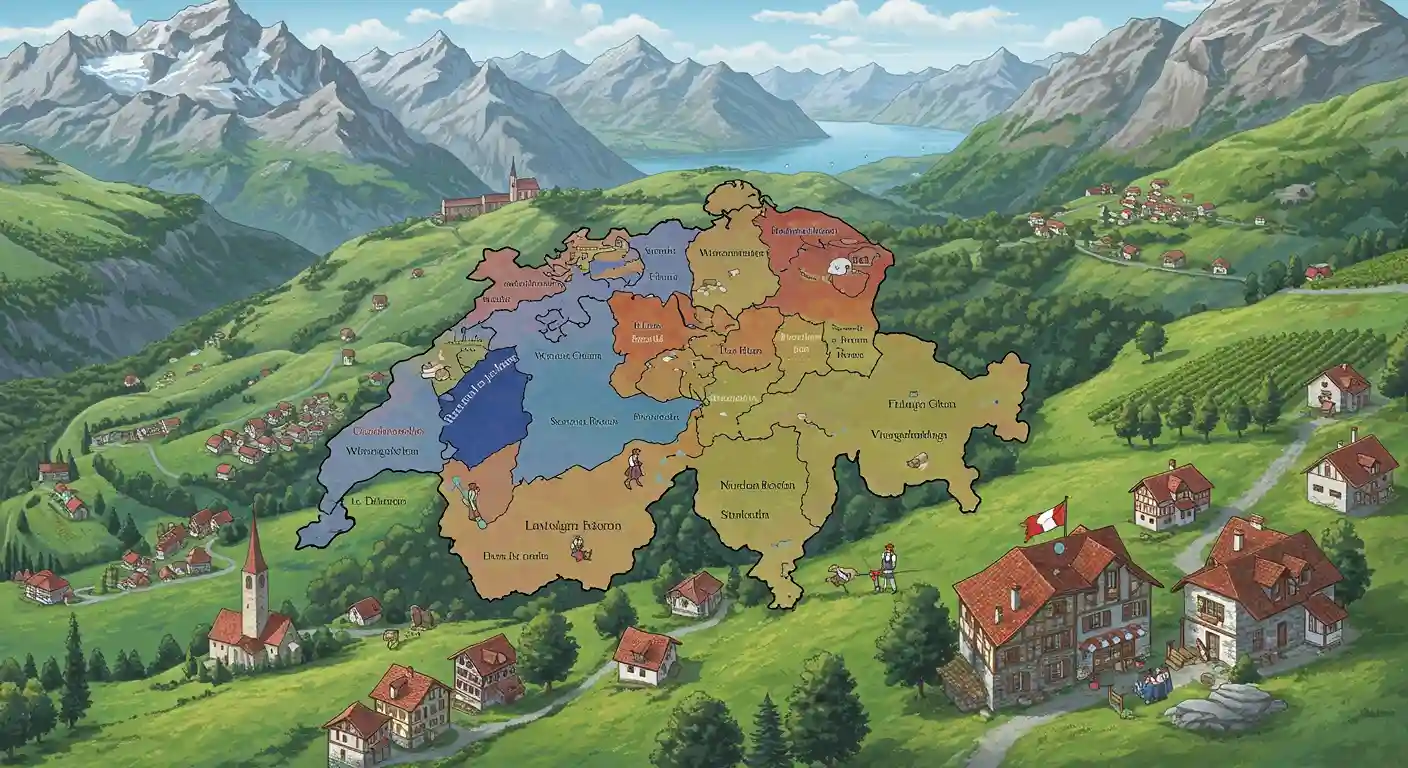

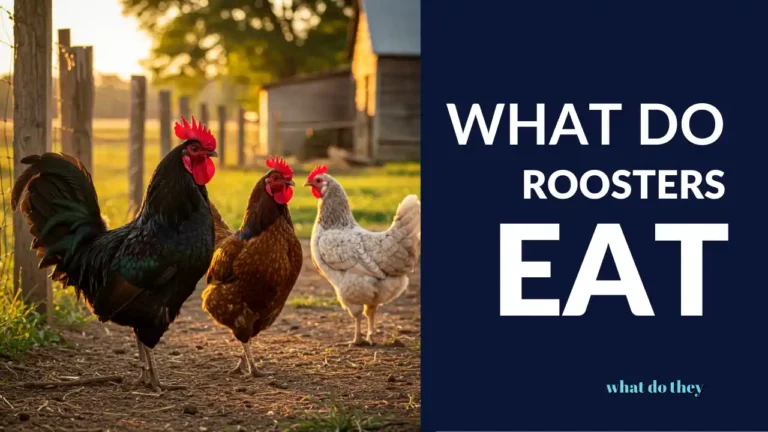




Leave a Comment